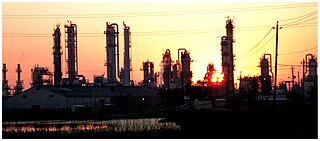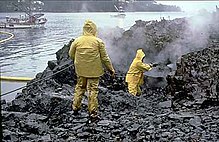
Chevron Corporation is an American multinational energy corporation predominantly specializing in oil and gas. The second-largest direct descendant of Standard Oil, and originally known as the Standard Oil Company of California, it is active in more than 180 countries. Within oil and gas, Chevron is vertically integrated and is involved in hydrocarbon exploration, production, refining, marketing and transport, chemicals manufacturing and sales, and power generation.

PJSC Rosneft Oil Company is a Russian integrated energy company headquartered in Moscow. Rosneft specializes in the exploration, extraction, production, refining, transport, and sale of petroleum, natural gas, and petroleum products. The company is controlled by the Russian government through the Rosneftegaz holding company. Its name is a portmanteau of the Russian words Rossiyskaya neft.

Suncor Energy Inc. is a Canadian integrated energy company based in Calgary, Alberta. It specializes in production of synthetic crude from oil sands. In the 2020 Forbes Global 2000, Suncor Energy was ranked as the 48th-largest public company in the world.

Sonatrach is the national state-owned oil company of Algeria. Founded in 1963, it is known today to be the largest company in Africa with 154 subsidiaries, and often referred as the first African oil "major". In 2021, Sonatrach was the seventh largest gas company in the world.

Hess Corporation is an American global independent energy company involved in the exploration and production of crude oil and natural gas. It was formed by the merger of Hess Oil and Chemical and Amerada Petroleum in 1968. Leon Hess was CEO from the early 1960s through 1995, after which his son John B Hess succeeded him as chairman and CEO. The company has agreed to be acquired by rival oil company Chevron.

ExxonMobil's Baytown Refinery is a major oil refinery named after and located in Baytown, Texas. It has capacity of 588,000 barrels per day (93,500 m3/d). The site first opened in 1919 and was originally operated by the Humble Oil Company. Today, it is the largest employer in the city. The plant has been expanded over the year to 3,400 acres (14 km2) of land next to the Houston Ship Channel.

Eni S.p.A., acronym for and formerly legally known as Ente nazionale idrocarburi, is an Italian multinational energy company headquartered in Rome. It is considered one of the "supermajor" oil companies in the world, with a market capitalization of €50 billion, as of 31 December 2023. The Italian government owns a 30.5% golden share in the company, 1.99% held through the Ministry of Economy and Finance and 28.5% through the Cassa Depositi e Prestiti. The company is a component of the Euro Stoxx 50 stock market index.
ExxonMobil Australia is an Australian affiliate of ExxonMobil, the U.S.-based oil giant. It operates a number of oil and gas platforms in Bass Strait, south east of Melbourne, Australia, as well as a gas processing facility at Longford and Long Island Point (LIP) in Hastings.
ExxonMobil has offshore oil production in Nigeria, and is the country's second largest crude oil producer. Mobil Producing Nigeria (MPN) began shallow water operations in 1955, and owns over 90 platforms and 300 producing wells covering 3,200 square kilometres.
The Greenpoint oil spill is one of the largest oil spills ever recorded in the United States. Located around Newtown Creek in the Greenpoint neighborhood of Brooklyn, New York City, between 17 and 30 million US gallons of oil and petroleum products have leaked into the soil from crude oil processing facilities over a period of several decades. The spill was first noticed in 1978, and soil vapor tests were still reported as returning positive in 2008.

QatarEnergy LNG, formerly Qatargas, is the world's largest liquefied natural gas (LNG) company. It produces and supplies the globe with 77 million metric tonnes of LNG annually from across its seven ventures—QatarEnergy LNG N(1), QatarEnergy LNG N(2), QatarEnergy LNG N(3), QatarEnergy LNG N(4), RL1, RL2 and RL3. It is headquartered in Doha, Qatar, and maintains its upstream assets in Ras Laffan, Qatar. Natural gas is supplied to the company's LNG trains from Qatar's North Field, by far the world's largest non-associated gas field. It reached a record LNG production of 77 million tonnes per year in December 2010. According to Brand Finance, QatarEnergy LNG is the world's fastest growing oil and gas brand in 2023. QatarGas is said to be used through gas diplomacy as leverage by Qatar on the EU and India to advance its interests and silence criticism of its human rights violations and corruption.

QatarEnergy, formerly Qatar Petroleum (QP), is a state owned petroleum company of Qatar. The company operates all oil and gas activities in Qatar, including exploration, production, refining, transport, and storage. The President & CEO is Saad Sherida al-Kaabi, Minister of State for Energy Affairs. The company's operations are directly linked with state planning agencies, regulatory authorities, and policy making bodies. Together, revenues from oil and natural gas amount to 60% of the country's GDP. As of 2018 it was the third largest oil company in the world by oil and gas reserves. In 2022, the company had total revenues of US$52bn, a net income of US42.4bn, and total assets of US$162bn. In 2021, QatarEnergy was the fifth largest gas company in the world.
Aera Energy LLC is a natural gas, oil exploration and production company started as a joint venture between Shell plc and Mobil. Headquartered in Bakersfield, California, Aera Energy LLC is a California limited liability company, and one of California's largest oil and natural gas producers, with an approximate 2015 revenues of over $2 billion. Aera is operated as a stand-alone company through its board of managers.
Petroleum industry in Guyana is rapidly evolving. Guyana has emerged as one of the newest petroleum producing regions in the world, achieving its first commercial grade crude oil draw in December 2019. Crude oil is sent abroad for refining.

BP p.l.c. is a British multinational oil and gas company headquartered in London, England. It is one of the oil and gas "supermajors" and one of the world's largest companies measured by revenues and profits. It is a vertically integrated company operating in all areas of the oil and gas industry, including exploration and extraction, refining, distribution and marketing, power generation, and trading.
Pioneer Natural Resources Company, headquartered in Irving, Texas, was a company engaged in hydrocarbon exploration. It operated in the Cline Shale, which is part of the Spraberry Trend of the Permian Basin, where the company was the largest acreage holder. In May 2024, the company was acquired by ExxonMobil.

China National Offshore Oil Corporation, or CNOOC Group, is the third-largest national oil company in China, after CNPC and China Petrochemical Corporation. The CNOOC Group focuses on the exploitation, exploration and development of crude oil and natural gas in offshore China, along with its subsidiary COOEC.

As the world's largest majority investor-owned oil and gas corporation, ExxonMobil has received significant amounts of controversy and criticism, mostly due to its activities which increase the speed of climate change and its denial of global warming.
ExxonMobil, an American multinational oil and gas corporation presently based out of Texas, has had one of the longest histories of any company in its industry. A direct descendant of John D. Rockefeller's Standard Oil, the company traces its roots as far back as 1866 to the founding of the Vacuum Oil Company, which would become part of ExxonMobil through its own merger with Mobil during the 1930s. The present name of the company comes from a 1999 merger of Standard Oil's New Jersey and New York successors, which adopted the names Exxon and Mobil respectively throughout the middle of the 20th century. Because of Standard Oil of New Jersey's ownership over all Standard Oil assets at the time of the 1911 breakup, ExxonMobil is seen by some as the definitive continuation of Standard Oil today.
The ExxonMobil Refinery in Beaumont, Texas was built along the banks of the Neches River in 1903. The refinery is currently one of the largest in the world with a nameplate capacity of 634,000 bpd. The plant is also highly integrated with petrochemicals production and lubricants and is a critical part of the Texas-Louisiana gulf coast energy infrastructure. The site encompasses more than 2,700 acres and is staffed by 2,000 employees daily plus another 3,000 contractors to support maintenance and construction activities.



















